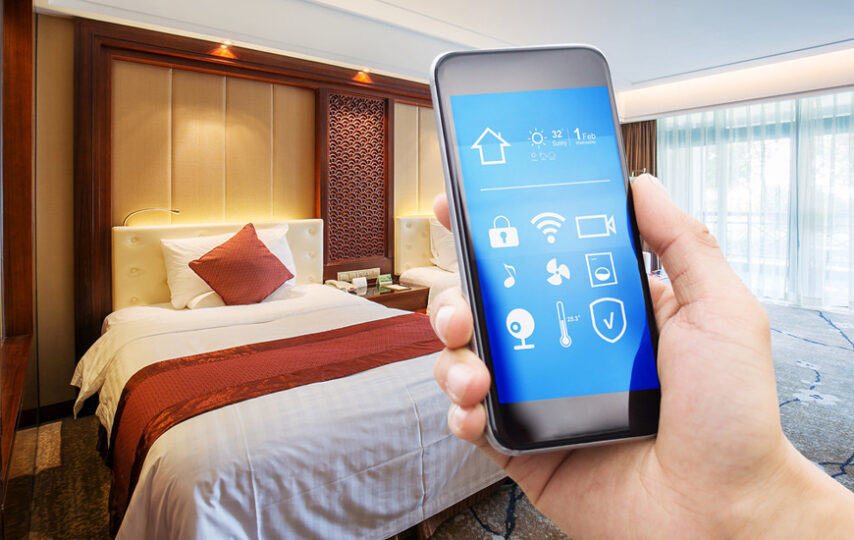The hospitality industry is one of the driving forces of the global economy. The industry is so dynamic and in a constant state of evolution and development. In recent years, the catering and hospitality industry has witnessed a surge in technology, which has redefined most of its operations.
Even before COVID-19 happened, several players in the catering and hospitality industry had already adopted the use of apps for hotel booking and food delivery. At the height of the pandemic in 2020, this became more pronounced as the industry implemented various protocols such as social distancing and minimized surface contact to curb the spread of the Covid virus.
Hospitality gone digital
In what seems like a wave of change that is sweeping across different sectors, the hospitality industry is following in the footsteps of other industries like retail, banking, and others that have adopted the digital revolution. Virtual kitchens have been established, which allow customers to order their foodstuffs from their handsets. Online orders are becoming the new big thing in the catering and hospitality industry.
As the sector recovers from the effects of the Coronavirus pandemic that almost brought it to its knees, here are some of the technological advancements that are revolutionizing the catering and hospitality industry.
Social media and peer review sites
The presence of social media has redefined the relationship between guests and hoteliers. Social media avenues provide suitable platforms for guests and potential customers to share experiences. They can share information regarding room rates, amenities, what they liked, and disliked.
Social media also provides guests with the opportunity to share reviews of hotels and their services online. The reviews have a huge influence on aspiring guests, as they look for information online. According to a study by PhoCusWright, close to 90% of customers feel confident in their decision when guided by reviews.
As more consumers do in-depth research before they make decisions, the hospitality and catering industry must work harder and smarter to avert the consequences of negative reviews. This has resulted in hotels setting up social media units to deal with the issue of bad reviews arising from customers.
Improved guest experience
Technology has also affected the way guests do their bookings. Traditionally, check-in and checkout procedures could be time-consuming and tedious, especially in large hotels. Through feedback and reviews, guests have expressed the need to have check-in and checkout procedures that are flexible according to their needs.
Those who want more time for enjoyment can get it, as well as those who would like quick departures. This concern led many hotels to offer their guests a new experience of registering even before they arrive at the actual facility. By using check-in apps, which are downloadable on their smartphones, guests can easily check-in before their arrival.
This has helped hotels to ease the wait at the registration desk, especially at this time of the pandemic. In some hotels, the guest’s smartphone also acts as the room key, so guests can easily move from the airport directly to their hotel rooms. This helps things to move faster and reduces the congestion often witnessed at the front desk.
All the same, while it has helped to speed up things, the smart booking technology also robs guests of the opportunity to interact directly with the front desk staff. Guests do not get the chance to inquire about possible room upgrades or special room deals upon registration.
For customers, it’s equally important to consider both the negative and positive implications when deciding to skip contact with the front desk staff at registration. Overall, the technological upgrade aims to create a mutually beneficial platform for both the guests and hotel service providers.
Improved targeting
For those who travel for conference and business purposes, technology has provided several impressive advances. Hotels can today use text messaging and Whatsup to notify their convention guests of the meeting room and possible schedule changes that may affect their events.
Through text messaging, hotels can also target specific convention groups for daily specials. This can range from spa treatments to restaurants and show tickets. Consequently, hoteliers can reach their guests in real-time and their market audience by extension—all at a low cost.
Improved checkout procedures
In connection to improving their guest experience, hotel guests are today able to checkout in the comfort of their hotel rooms. Courtesy of technology, guests can view all their room charges on the TV screen in their rooms. Once they confirm the charges are accurate, they can simply checkout with just a few clicks to avoid passing through the front desk.
Overall, the rapid checkout process allows visitors to enjoy the final hours of their stay while allowing for a faster departure to the airport.
Robots in hotels and restaurants
Perhaps the most exciting technological advancement in the catering and hospitality industry is the use of robots in hotels and restaurants. Many hotels today apply robotic technology to perform tasks traditionally done by humans. For example, hoteliers are using robots to work as janitors, welcome guests, and give them important client information.
This practice is replicated in other sections of the industry like restaurants where robots can perform similar tasks. In an era of the COVID-19 pandemic, this technology can help make hotels and restaurants more COVID-secure.
Well, when it comes to hospitality management, robots promote an unbiased working process. Apart from that, social robots may help take care of the guests much better with consistent and repetitive working processes.
The use of chatbots
The use of chatbots is another emerging technology in the hospitality industry. This technology is gaining traction, as customers demand quick answers to their questions at any time of the day or night. With different time zones involved, hotels and restaurants cannot find staff available at all times.
Providers in the catering and hospitality sector are waking up to the fact that this technology could help them save money in hiring and staff maintenance. Chatbots can work non-stop without getting tired, without compromising the quality of service. Where it cannot handle, a chatbot can pass the concern to a human staff at the earliest opportunity.
Virtual reality and IoT
In this era of the internet, hospitality service providers are using the technology to give their potential customers a virtual presentation of the facility before their actual visit. Through virtual reality, clients can get a clear sense of what to expect when they’re actually on the ground.
This technology became even more useful during the COVID pandemic, as marketing staff in the catering and hospitality industry could use it to gain an edge over their rivals. Virtual reality videos are accessible through web browsers and could be complemented with a VR headset.
Similarly, the Internet of Things (IoT) is another technology that is revolutionizing the hospitality industry. This technology involves making everyday objects, appliances, and devices internet-compliant. The internet-enabled devices can be used to collect data or communicate over the internet.
An example of this application is internet-enabled thermostats used for adjusting room temperature automatically in different facilities. The same technology can work for lighting and other areas. The idea is to streamline everything to work automatically and smoothly with minimum or no human intervention.
Recognition technology and AI
In the catering and hospitality industry, recognition technology is used to facilitate seamless authentications. The use of biometrics could help some hotel processes and purchases. Different catering and hospitality facilities today use the technology for seamless purchases, authenticated by touch.
Final thoughts
The catering and hospitality industry will continue to evolve in line with the prevailing technological advancements. As the industry recovers from the economic slump caused by the pandemic, the mentioned technologies play a critical role in the current operations of hotels and restaurants.
Other technological developments shaping this industry include augmented reality, cyber security, and big data. While implementing new technologies, hospitality service providers should also watch some of the challenges that may follow them, such as interoperability, security and privacy, responsiveness, and data management.
Author Bio
Alexander Mirza, The Founder & CEO of Mogul – Humanizing Travel. Its platform Staymogul.com provides booking, service, and talent solutions for the hospitality industry.







